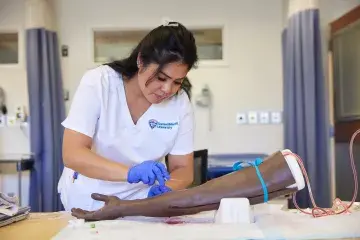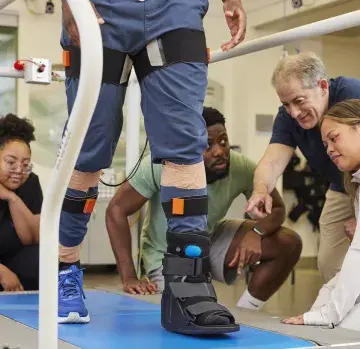Innovative Nursing Program Combines Compassion with Science
Mindfulness training, rooted in thousands of years of meditation practice, is widely used in workplaces and medical schools to reduce stress and improve performance. A new Samuel Merritt University (SMU) nursing program is among the first of its kind in the nation to include mindfulness as a cornerstone of its curriculum.
Students in the RN to BSN program begin their studies with a 30-hour mindfulness-based stress reduction (MBSR) course, aimed at reconnecting working nurses to the compassionate values that inspired them to become nurses in the first place.
“Most nursing programs now focus on the cognitive,” said Professor Richard MacIntyre, PhD, director of the RN to BSN program. “What’s been lost is the essence of humanistic connections and the practices that sustain them. We need to support each other as caregivers.” 
Launched in May, the program is designed to help working registered nurses in Northern California gain leadership and teamwork skills that will enable them to advance their careers and help transform healthcare delivery. Research shows that boosting educational levels among nurses improves patient safety and health outcomes because of the critical role nurses play in healthcare.
MacIntyre said the program aims to help RNs “discover a vision, find their voice, and own their practice” so they emerge as more confident professionals with greater job satisfaction.
Student Elizabeth Snyder, a nurse in the emergency room at Kaiser in Santa Rosa, said earning a bachelor’s degree has been her goal since 1997 when she graduated from the RN program at a junior college, but life got in the way. She said the program has pushed her out of her comfort zone.
“Having been a bedside nurse all these years, it’s a stretch for me to think in visionary terms. I tend to focus on what’s right in front of me,” said Snyder. “This program is widening my perspective on what my profession is all about. What’s stretching me the most is to think of myself as a leader. That’s a new direction for me.” 
Snyder said she had applied many of the program’s mindfulness practices into her life even before completing her first semester in July. She meditates every morning and often devotes 20 minutes of her lunch break at work to do a body scan — a technique that trains the mind to move from detailed attention to wider awareness.
“It pulls me away from all the stress,” she said. “I have better clarity when I go back to work.”
In June, the program’s first two cohorts in Oakland and Sacramento attended daylong silent retreats to help them apply and practice what they were learning in their MBSR class. The retreats included yoga, meditation, breathing and movement exercises.
Adjunct Assistant Professor James Mitchell, who teaches the MBSR course, said silent retreats are the way meditation was traditionally taught. He said the RN to BSN students appreciated the experience of being silent and disconnecting from their electronic devices and busy lives for a full day. Some students later told him that they are now more sensitive to the world around them.
“You come to understand that meditation is not limited to sitting cross-legged on a cushion,” he said. “It extends to everyday activities.”
With mindfulness as a core principle of the program, all of the program’s classes and faculty meetings begin with a centering exercise to bring into focus why they do the work they do.
The training benefits nurses both professionally and personally, according to Mitchell. By boosting their powers of empathy and compassion, he says they can be more present with their patients as well as manage their own stress.
 “It helps nurse tap into their humanity,” said Mitchell. “Mindfulness increases their focus and concentration and their ability to let go of a day when it’s over.”
“It helps nurse tap into their humanity,” said Mitchell. “Mindfulness increases their focus and concentration and their ability to let go of a day when it’s over.”
Professor Paulina Van, PhD, who has been starting all of her classes and meetings with a meditation session for the past two years, said surveys of her students demonstrate that the practice enhances learning and team cohesion.
SMU developed the RN to BSN program in collaboration with Kaiser Permanente following a recommendation by the Institute of Medicine that 80 percent of the RN workforce is baccalaureate prepared by 2020 and that health systems build an infrastructure that helps enable nurses to lead change and promote health.
Kaiser, which set a goal of having 500 of their registered nurses earn a bachelor’s degree in the next five years, is offering significant financial assistance to its RNs who enroll in the program though its Nurse Scholars Academy.
“The fact that Kaiser as a corporation is investing in its nurses by paying for a significant portion of this program is kind of unheard of,” notes Snyder, who has been a Kaiser nurse for 18 years. “I am really impressed.”
Tailored to busy professionals, the part-time program takes students 20 months — or five semesters — to complete, with a third of instruction time performed online and the rest in person during a weekly four-hour class and one Saturday session per term. It includes classes on leadership, research, statistics, pathophysiology, pharmacology, and health policy.
Roselyne Kiberenge, who is juggling classes with her nursing job and the demands of a young child, said the first semester of the program taught her the importance of taking care of herself as well as others by eating and sleeping better. A native of Kenya, Kiberenge said the leadership class also helped her to envision her future goal of working for an international relief organization.
“I feel like it’s made me a better nurse,” she said. “I’m much more aware.”
Van said she has witnessed a transformation among her students that far exceeded her expectations.
“This is a phenomenal group of scholars that have been fully engaged, responded to new information and made it come alive,” said Van. “This is more than academic to them; this is life changing for them.”


